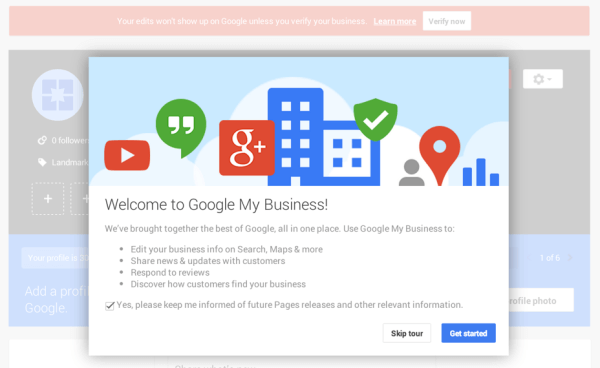Up Close @ SMX Advanced: Local Super Therapy Session
Local SEO is a tough beast to tame, so it wasn’t surprising that the room was packed for the Let’s Talk Local Search: Super Therapy Session For Advanced Local Marketers session that kicked off SMX Advanced 2014. Moderator Matt McGee, editor in chief of Search Engine Land, decided to make the session a slide-free discussion panel, […]
Local SEO is a tough beast to tame, so it wasn’t surprising that the room was packed for the Let’s Talk Local Search: Super Therapy Session For Advanced Local Marketers session that kicked off SMX Advanced 2014.
Moderator Matt McGee, editor in chief of Search Engine Land, decided to make the session a slide-free discussion panel, since the basics of local search are well documented. Instead of making the panel prepare the same old slides, we were treated to an hour and twenty minute in-depth Q&A session.
Google My Business
With the announcement of the new Google My Business platform released only hours before, the session couldn’t have been timed better. Local search consultant Mike Blumenthal started the session off with a live demo and explanation of the new dashboard. Thanks to his connections, he had pre-release access to the new system, so he walked through the important updates and pointed out exciting features.

Mike Blumenthal
Now that Places and Plus have finally merged, business owners have one location to edit all of their information on Google. “It’s the first time we’ve had a solid forward facing brand for local businesses in Google in 3 or 4 years,” said Blumenthal. Google My Business is a portal to business apps, not just Places. It’s card-based, so the interface is much cleaner and easier to navigate.
Everyone was excited to hear that Google My Business also includes social interaction data for Google Plus posts. If a site is associated with Google Analytics, there’s also a link to Analytics on the dashboard.
David Mihm, Director of Local Search Strategy for Moz, explained that while no one was looking for the last two years, Google was building a completely new small business support architecture. Google My Business is a big move by Google to help small businesses understand what’s going on.
Local Is Now About Interaction

Mary Bowling
The clear theme of the morning was that the basics of Local SEO (claiming listings, local optimization, NAP consistency) are old hat. The panelists kept emphasizing that social interaction and brand building were the new secret sauce for Local Search success.
Mary Bowling, a local SEO practitioner and consultant from Ignitor Digital, explained that she has a tough time refocusing old-school businesses away from link building and towards brand building. Businesses have to be more involved in their local strategy, and it’s going to require more effort to stand out from competitors. “The people that want to be hands off in Local Search moving forward are probably not going to see good results,” said Bowling.
A Shift In Thinking About Citations

Thomas Ballantyne
The conversation turned to focus on citations, and the panelists all agreed that there’s been a shift in the importance of citations. In the past, if your NAP (Name, Address, Phone number) information wasn’t consistent everywhere it was listed, cleanup was a huge priority. Now, Mary Bowling suggested that if there’s lots of garbage out there, businesses should just concentrate on the major directories.
Since so many site have adopted a “pay to play” system where business owners have to pay to update their listings, it’s not likely that Google will pay attention to any incorrect information listed on those sites. David Mihm explained that since many of the second and third tier directories lost rankings and traffic thanks to Panda and Penguin, they’ve lost authority in the local ecosystem.
Thomas Ballantyne, Director of Marketing for Bulwark Exterminating said, “For local SEO, citations are kinda like links. We know links have been devalued… citations have too.” Just like buying links, buying a citation from 10,000 directories will do nothing for you.
Don’t Think Of Reviews As A Ranking Factor

David Mihm
When the discussion turned to reviews, Mary Bowling stressed that businesses shouldn’t look at reviews as a ranking factor. Reviews are more about brand building and customer experience.
Someone asked if they could ever beat Yelp in the SERPs. Thomas Ballantyne said that it’s not about outranking Yelp – it’s about beating Yelp. If you have 100 reviews that show on your Google listing, you’re beating Yelp.
David Mihm jumped in and said that while Yelp is important in every business category, it’s not well-known in most cities. Instead of trying to get customers to leave reviews on a system they’re not familiar with, businesses should focus their efforts on collecting reviews on sites that are well-known in their industry.
Call Tracking Is Bad For Local SEO

Dana DiTomaso
As Matt McGee was reading an audience question about call tracking, Dana DiTomaso from Kick Point interrupted and said to the crowd “Don’t do that! Who’s doing that?”
Everyone laughed, and then the panelists got serious. They all emphasized that call tracking numbers are extremely bad for Local SEO. A consistent local phone number is a huge signal of local relevancy. Since it’s easy for phone numbers to leak out into the ecosystem, businesses shouldn’t use different numbers.
Mike Blumenthal stressed that businesses can only do call tracking if they’re using a single tracking number and that number becomes the sole number that exists for the business.
Thomas Ballantyne jumped in and said that businesses also had to be sure that they own the tracking number. Otherwise, they’d have to change the number everywhere if they ever stopped using the tracking provider.
Opinions expressed in this article are those of the guest author and not necessarily Search Engine Land. Staff authors are listed here.
Related stories

